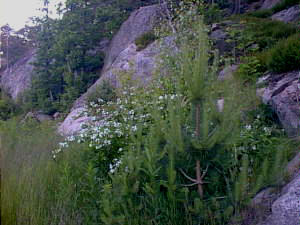Thursday 15 June 2000

|
Pic of the day: The fractal pattern of this very young pine is simple, yet effective. It also happens to be quite beautiful, don't you think? The light green shots is this year's growth. PatternsI turned on my computer this morning, and there was a short grinding noise; then just a blinking dot. I've seen this twice before. The first time was just after I had bought The Sims and just before I was rushed to hospital. That time, I handed in my PC for repair and it took around a week. The next time, I spent the evening fixing it myself. This time, I spent 10 minutes fixing it. I also found that each time it happened after I had started the portable with a floppy in it, and at least the last two times it was the same floppy. (One I carry between work and home sometimes.) So this time, I made the floppy into a system disk. I expect this to be the end of the problem. But it made me think. The reason for the improved performance is that I found a pattern. Once I found a pattern in the events, I could make a good guess as to what had happened, and eventually how to prevent it from happening again. ***The pattern matching abilities of the human brain is impressive. Its speed and flexibility is easily demonstrated by our sight, which lets us recognize objects from various angles and whether or not they - and we - are moving. You use the same pattern matching to read this in virtually any font that uses the same basic alphabet. Small and large, cursive, decorative, there are hundreds and thousands of fonts and most any of them can be read by quite ordinary people. Extraordinary people, such as you and me, can also read while riding a bus or walking. (I've tried to limit reading while biking, though...) The same pattern matching abilities come into play when we listen to people speaking. Objectively, the sounds are quite different when they come from a small child or a grown man, and yet we register the same words. Singing distorts the sounds even much more, and yet we are able to listen to the text without any effort if it is in our mother tongue or at least a familiar language. When we read in an alphabetic script (as opposed to pictographic scripts like Chinese) we first match the font or handwriting with our idea of the "ideal" letter, then match these with the sounds that make up words, then match these words with deeper representations of meaning in our brain. It is little short of a miracle that we understand anything at all. ***Funny thing, then, that it can be so hard to recognize patterns in our own life. I was old enough to remember fairly clearly when it finally dawned on me that there was a connection between eating three servings of dinner and having my stomach hurt a little bit later. Ahem. There have been other "oh!" experiences after that. Children and the young will just learn any random thing; but as we grow older, we start to learn in a different way. We start to look for lines in the knowledge we already have. We judge new knowledge by comparing it to what we already know. That is, we start to look for patterns. Where we once just cared for knowledge, we now look for insight. Eventually, one would hope, insight may lead to wisdom. But how many wise men are there today? Now think about this. We are 6 billion humans. The average lifespan has approximately doubled in a few generations. And we have a wealth of knowledge: A single dictionary holds knowledge like a royal library of old. Children know things that were mysteries to great scientists until recently. Yet, tell me: Is the world full of wise men? Or even wise women? Is our civilization teeming with sages? It seems to me that you hardly hear the word "wisdom" anymore. There's intelligence, skill, cleverness. Useful things all, but wisdom is more. Wisdom is to live in understanding. And I have on good authority that no one has ever become wise without seeing their own foolishness. (Of course, other people's stupidity is also instructive, and far more amusing.) |
Rain, sun, and often at the same time. |
Yesterday <-- This month --> Tomorrow?
One year ago